Accelerate > Publications
Search this online library featuring the latest FAO publications, issue papers and briefs which offer up-to-date knowledge and innovative insights for SDG acceleration.
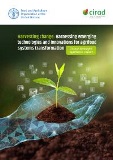
Harvesting change: Harnessing emerging technologies and innovations for agrifood system transformation
2023
The study assesses a selection of technologies and innovations, which potentially could be of paramount importance in addressing agrifood challenges until 2050, as well as the most important trends and drivers that will influence the emergence of agrifood technologies and innovations and their triggers of change, including some regional aspects. The goal is also to build plausible future scenarios for the evolvement of the emerging technologies and innovations in the future with the time...
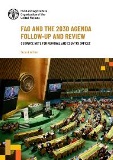
FAO and the 2030 Agenda Follow-up and Review: Guidance Note for Regional and Country Offices
2023
The Guidance Note describes the process of the preparation of the VNRs and what FAO Regional and Country Offices need to be aware and mindful of when providing support to the national partners. It covers information about the importance of the follow-up and review process for the 2030 Agenda and the SDGs, including information about the gaps in the coverage of the Voluntary National Reviews, and recommendations on strengthening VNRs to be meaningful instruments for the acceleration of the SDGs.
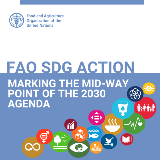
FAO SDG Action: Marking the mid-way point of the 2030 Agenda
2023
As we stand at the midpoint of the 2030 Agenda, it is both a moment of reflection and an opportunity to renew our commitment to achieving the SDGs. In August 2023, the FAO Office of SDGs launched a survey, receiving over 600 responses that shared valuable insights, experiences and actions taken by FAO offices towards the achievement of the SDGs. In addition this survey, FAO project data was leveraged to present this visual representation of FAO’s contribution to the 2030 Agenda implementation.
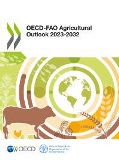
OECD-FAO Agricultural Outlook 2023-2032
2023
The Agricultural Outlook 2023-2032 is a collaborative effort of the Organisation for Economic Co-operation and Development (OECD) and the Food and Agriculture Organization of the United Nations (FAO). It brings together the commodity, policy and country expertise of both organisations as well as input from collaborating member countries to provide an annual assessment of the prospects for the coming decade of national, regional and global agricultural commodity markets.
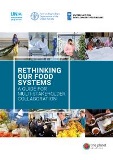
Rethinking our food systems: A guide for multi-stakeholder collaboration
2023
This guide aims to support stakeholders working at all levels of the food system in the implementation of actions to transform their food systems. Centered on 5 building blocks underpinning successful multi-stakeholder collaboration for food systems transformation, the guide uses these constructions to illustrate ingredients of the process and show the interconnectedness of the steps needed to be successful.
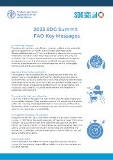
2023 SDG Summit: FAO Key Messages
2023
The 2023 SDG Summit will serve as a pivotal event towards achieving the SDGs, as gathered Heads of State and Government are to carry out a comprehensive review of progress, respond to the impact of multiple crises, and provide high-level political guidance on transformative and accelerated actions for achieving the 2030 Agenda. FAO has developed these key messages to inform the discussions in the lead up to and during this Summit and the Political Declaration which will result from them.
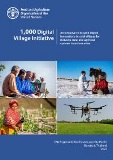
1,000 Digital Village Initiative - An initiative to expand digital innovations in rural villages for inclusive rural and agrifood systems transformation
2022
This report introduces the FAO Digital Village Initiative, which aims to facilitate through knowledge and information. It approaches countries and communities to develop, accelerate and deploy digital technologies in rural villages and communities. The report introduces the Digital Village Ecosystem approach. It describes an instrument (tool) to gather information and provide a village ecosystem assessment to help generate recommendations for future interventions to deploy beneficial, ...

South-South in Action - South-South and triangular cooperation in agricultural development: FAO's experiences
2022
This publication outlines key features of South-South and Triangular Cooperation (SSTC) and how FAO has applied SSTC to the delivery of its mission. The case studies presented provide a window on how SSTC has contributed to alleviating hunger and malnutrition in countries across the global South and has helped build resilience in the face of climate change and other development challenges.
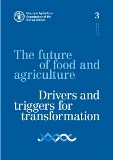
The future of food and agriculture – Drivers and triggers for transformation
2022
This report aims at inspiring strategic thinking and actions to transform agrifood systems towards a sustainable, resilient and inclusive future, by building on both previous reports in the same series as well as on a comprehensive corporate strategic foresight exercise that also nurtured FAO Strategic Framework 2022–31. It analyses major drivers of agrifood systems and explores how their trends could determine alternative futures of agrifood, socioeconomic and environmental systems.

FAO’s work on South–South and Triangular Cooperation in sub-Saharan Africa: Exchanging rice-farming knowledge and technology for food security
2022
FAO has worked with a range of partners on successful South–South and Triangular Cooperation agreements to benefit Africa, including Brazil, China, the Republic of Korea, Morocco, the Bolivarian Republic of Venezuela and Viet Nam. These Global South partners bring considerable knowledge and experience borne from decades of national development progress and international development assistance. Their cooperation embodies solidarity among peoples and countries of the Global South.
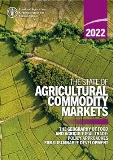
The State of Agricultural Commodity Markets 2022 - The geography of food and agricultural trade: Policy approaches for sustainable development
2022
This edition of The State of Agricultural Commodity Markets (SOCO) discusses how trade policies, based on both multilateral and regional approaches, can address today’s challenges for sustainable development. Trade policies in food and agriculture should aim to safeguard global food security, address the trade-offs between economic and environmental objectives, and strengthen the resilience of the global agrifood system to shocks, such as conflicts, pandemics and extreme weather.
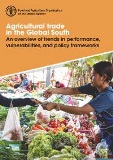
Agricultural trade in the Global South - An overview of trends in performance, vulnerabilities, and policy frameworks
2022
South-South Cooperation (SSC) is increasingly recognized as an effective instrument for catalyzing economic development by fostering the exchange of innovation and good practices, and expanding market opportunities across countries with a similar level of development and shared development objectives, such as those reflected in the Sustainable Development Goals (SDGs).
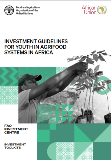
Investment guidelines for youth in agrifood systems in Africa
2022
The Investment guidelines for youth in agrifood systems in Africa, developed jointly by FAO and the African Union Commission (AUC) through a multi-stakeholder and participatory process, highlight the importance of youth as change agents and key stakeholders contributing to sustainable agrifood systems. The guidelines aim to accelerate investments in and by youth in agrifood systems by providing practical guidance - including tools and examples ...
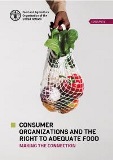
Consumer organizations and the right to adequate food - Making the connections
2021
Consumers are a powerful force for change towards a sustainably developing world that leaves no one behind and respects the human rights of all. This publication is aimed at making the connections between the important work of consumer organizations and the realization of the right to adequate food, increasing the visibility of these organizations and highlighting their importance to food security, healthy diets and food systems transformations.
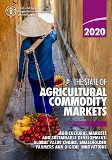
The State of Agricultural Commodity Markets 2020 - Agricultural markets and sustainable development: Global value chains, smallholder farmers and digital innovations
2020
The State of Agricultural Commodity Markets 2020 (SOCO 2020) aims to discuss policies and mechanisms that promote sustainable outcomes – economic, social and environmental – in agricultural and food markets, both global and domestic. The analysis is organized along the trends and challenges that lie at the heart of global discussions on trade and development.
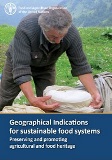
Geographical Indications for sustainable food systems - Preserving and promoting agricultural and food heritage
2019
A geographical indication (GI) is a label that applies to products with specific quality, reputation or other characteristics resulting from their geographical origin. These specific characteristics can be the result of natural or human factors. GIs are protected by intellectual property rights (IPR) according to the World Trade Organization agreement on Trade-Related Aspects of Intellectual Property Rights (TRIPS) and the Geneva Act.
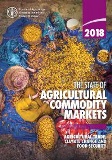
The State of Agricultural Commodity Markets 2018 - Agricultural trade, climate change and food security
2018
This edition of The State of Agricultural Commodity Markets focuses on the complex and underexplored intersection between agricultural trade, climate change and food security. The report makes an important contribution to the policy debates on climate change adaptation and mitigation under the Paris Agreement and the multilateral agricultural trade rules.
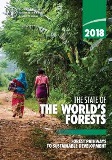
The State of the World’s Forests 2018 - Forest pathways to sustainable development
2018
This edition of The State of the World’s Forests is aimed at enhancing our understanding of how forests and their sustainable management contribute to achieving several of the SDGs. Time is running out for the world’s forests: we need to work across sectors, bring stakeholders together, and take urgent action. The State of the World’s Forests 2018 identifies actions that can be taken to increase the contributions of forests and trees that are necessary to accelerate progress towards the SDGs.
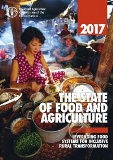
The State of Food and Agriculture 2017 - Leveraging food systems for inclusive rural transformation
2017
One of the greatest challenges today is to end hunger and poverty while making agriculture and food systems sustainable. The challenge is daunting because of continued population growth, profound changes in food demand, and the threat of mass migration of rural youth in search of a better life. This report presents strategies that can leverage the potential of food systems to become the engine of inclusive economic development and rural prosperity in low-income countries.
Browse by SDG
- SDG1: No Poverty
- SDG2: Zero Hunger
- SDG3: Good Health & Well-being
- SDG4: Quality Education
- SDG5: Gender Equality
- SDG6: Clean Water & Sanitation
- SDG7: Affordable and Clean Energy
- SDG8: Decent Work and Economic Growth
- SDG9: Industry, Innovation and Infrastructure
- SDG10: Reduced Inequalities
- SDG11: Sustainable Cities and Communities
- SDG12: Responsible Consumption and Production
- SDG13: Climate Action
- SDG14: Life Below Water
- SDG15: Life on Land
- SDG16: Peace, Justice and Strong Institutions
- SDG17: Partnerships for the Goals
Browse by Better
Browse by Priority Area
- Innovation for Sustainable Agriculture Production
- Blue Transformation
- One Health
- Small-Scale Producers' Equitable Access to Resources
- Digital Agriculture
- Healthy Diets for All
- Nutrition for the Most Vulnerable
- Safe Food for Everyone
- Reducing Food Loss and Waste
- Transparent Markets and Trade
- Climate Change Mitigating and Adapted Agrifood Systems
- Bioeconomy for Sustainable Food and Agriculture
- Biodiversity and Ecosystem Services for Food and Agriculture
- Achieving Sustainable Urban Food Systems
- Gender Equality and Rural Women's Empowerment
- Inclusive Rural Transformation
- Agriculture and Food Emergencies
- Resilient Agrifood Systems
- Hand-in-Hand Initiative
- Scaling up Investment
